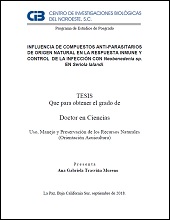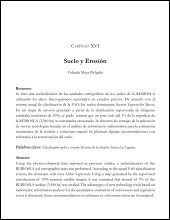| dc.contributor | JUAN CARLOS PEREZ URBIOLA | |
| dc.contributor | FELIPE DE JESUS ASCENCIO VALLE | |
| dc.creator | ANA GABRIELA TRASVIÑA MORENO | |
| dc.date | 2018 | |
| dc.identifier | http://cibnor.repositorioinstitucional.mx/jspui/handle/1001/1391 | |
| dc.identifier.uri | http://dspace.cibnor.mx:8080/handle/123456789/2744 | |
| dc.description | "El cultivo en jaulas de Seriola sp. (Pisces: Carangidae) a nivel internacional reporta serios problemas con parásitos monogeneos en piel, afectando severamente el crecimiento y provocando mortandad en los cultivos. Los tratamientos actualmente utilizados contra ectoparásitos monogenenos, resultan ser costosos de difícil aplicación, no aptos para consumo humano, implican un esfuerzo laboral considerable, y además, son muy estresantes para los peces (Militz et al., 2013; Sharp et al., 2004). El uso de extractos naturales dieta surge como una alternativa para control y tratamiento de parásitos. La herbolaria, es una fuente biológica rica en productos activos con propiedades antibacteriales, antiinflamatorias y antihelmínticas (Hutson et al., 2012). A partir de esta necesidad surge el objetivo de esta tesis, evaluar la eficacia de 6 extractos (ajo, jengibre, albahaca, chaparro amargo, cebolla y papaya) de origen natural con actividad anti-parasitaria, para ser utilizados en el tratamiento contra el ectoparásito Neobenedenia sp en cultivos de S. lalandi. Primeramente, realizamos la evaluación in vitro de los extractos naturales en tres diluciónes (1:100, 1:50 y 1:10) contra Neobenedenia sp y determinamos que el extracto con mayor actividad anti-parasitaria es el jengibre ya que reduce la supervivencia de los adultos, el tiempo de sujeción a la placa de cultivo, la producción de huevos y supervivencia larvaria. Evaluamos la toxicidad del extracto de jengibre suministrado en la dieta de juveniles de jurel, demostrando que, en los parámetros de crecimiento, hematológicos y expresión relativa de los genes IL 1- y TNF en timo y riñón cefálico, no hay diferencias estadísticas al compararlos con los parámetros obtenidos en el grupo control. Seguido a esto, evaluamos la respuesta inmune de S. lalandi infectado con Neobenedenia sp y determinamos, que a una intensidad promedio de 64.44 12.83 parásitos/pez, significativamente: incrementa la producción de mucus (P< 0.05), es menor la ganancia en peso (P = 0.034), disminuyen el porcentaje de linfocitos, se incrementa el porcentaje de monocitos, neutrófilos y eosinófilos, así como se incrementa la expresión relativa de TNF a las 24h post-infección en riñón cefálico..." | |
| dc.description | "The sea cage culture of Seriola sp. (Pisces: Carangidae) internationally reports serious problems with monogeneans skin parasites, affecting growth and causing mortality in the cultures. The currently used treatments against monogeneans ectoparasites (formalin, Praziquantel, Hydrogen Peroxide, copper sulfate, among others) are expensive, difficult to apply and unfit for human consumption, they considerable work effort and are very stressful for fish (Militz et al., 2013; Sharp et al., 2004). The use of natural extracts incorporated into the diet appears as an alternative for the control and treatment of parasites. Herbalism, including seaweed species, is a biological source rich in active compounds with antibacterial, anti-inflammatory and anthelmintic properties (Hutson et al., 2012). The objective of this thesis arises from this need, thereby we evaluate the effectiveness of 6 plants extracts (garlic, ginger, basil, bitter chaparro, onion and papaya) with anti-parasitic activity, to be used in the treatment against the ectoparasite Neobenedenia sp in S. lalandi cultures. Firstly, we evaluated in vitro the plant extracts in three dilutions (1: 100, 1:50 and 1:10) against Neobenedenia sp and we determined that ginger is the extract with the highest anti-parasitic activity, it reduces the survival of adults, time of attachment to the culture plate, egg production, as well as larval survival. From these results, we evaluated the toxicity of ginger extract supplied through the diet in juvenile of S. lalandi (dose1: 1 g of ginger / kg fish), demonstrating that there is no statistical differences, in the growth parameters, hematological and relative expression of the genes IL 1- and TNF in thymus and head kidney, when compared with the parameters obtained in the control group. Following this, we evaluated the immune response of S. lalandi infected with Neobenedenia sp and determined that S. lalandi in response to this parasitic infestation (average intensity 64.44 12.83 parasites per fish) it significantly: increased mucus production (P <0.05) , the gain in weight is lower (P = 0.034), the percentage of lymphocytes decreases, the percentage of monocytes, neutrophils and eosinophils increases and 24h post-infection the relative expression of TNF increases in head kidney tissue..." | |
| dc.format | application/pdf | |
| dc.language | spa | |
| dc.publisher | Centro de Investigaciones Biológicas del Noroeste, S.C. | |
| dc.rights | info:eu-repo/semantics/openAccess | |
| dc.rights | http://creativecommons.org/licenses/by-nc-nd/4.0 | |
| dc.subject | info:eu-repo/classification/AUTOR/Neobenedenia, S. lalandi, extractos naturales | |
| dc.subject | info:eu-repo/classification/AUTOR/natural extracts | |
| dc.subject | info:eu-repo/classification/cti/2 | |
| dc.subject | info:eu-repo/classification/cti/24 | |
| dc.subject | info:eu-repo/classification/cti/2412 | |
| dc.subject | info:eu-repo/classification/cti/241206 | |
| dc.subject | info:eu-repo/classification/cti/241206 | |
| dc.title | Influencia de compuestos anti-parasitarios de origen natural en la respuesta inmune y control de la infección con Neobenedenia sp. en Seriola lalandi | |
| dc.type | info:eu-repo/semantics/doctoralThesis | |
| dc.type | info:eu-repo/semantics/acceptedVersion | |


